Some individuals remain in grief longer. Some because of prolonged grief or in other cases depression, while others develop maladaptive coping strategies that keep them in acute grief longer. It is important to realize one never recovers from grief or loss because the object or person lost was loved, but one does learn to adjust and process through the acute grief phase. Those who do not usually do not because of poor coping and views on the loss.
Play Therapy and Grief Counseling Video
Play Therapy is an important type of therapy in counseling for children. It helps children better express themselves about trauma, loss, or emotional issues. Children are less verbal and the play associates more with their brain development in how they communicate. Clinical Professional Counselors who specialize in play therapy are able to help children face issues and help them find healing. Grief Counselors can utilize Play Therapy as well in helping grieving children. Obviously, pastoral counselors cannot utilize this type of therapy even if grief certified since they are not licensed counselors, but those certified in grief counseling who are also licensed counselors are employ its use in helping children grieve properly. For those who not licensed counselors, but still perform grief counseling at a pastoral level, one can discuss basic loss with a child but if it becomes apparent of deeper pathology, the child should be referred to a licensed counselor who specializes in play therapy.
Please also review AIHCP’s Grief Counseling Certification as well as its Child and Adolescent Grief Counseling Program
Grief and Play Therapy with Children
Grief is a universal and unbiased in who it afflicts. Unfortunately, children suffer in this fallen world of pain and loss. Throughout the world, children are plagued with horrible images that adults in many nations would never imagine. Children are victims of war, bombings, loss of family and many traumatic incidents. Children are abused in every corner of the world and face horrible trauma. Beyond the most traumatic events, children experience loss at early ages. The loss of a grandparent, or family member, or even a beloved pet. No loss is too small for a child.
Licensed counselors who specialize in children psychology and have training in Play Therapy can help children face trauma, grief and loss. In addition, many licensed professionals and human service professionals earn additional certifications to help children. Some may even specialize in Child and Adolescent Grief Counseling and have a greater understanding of children and the nature of loss. Licensed professionals with specialties and additional training certificates can help children process emotional pain because they are trained to identify and communicate to children. Play Therapy is one type of advanced counseling technique that counselors can utilize to help children.

Children grieve differently from adults due to their brain development. Many children are so young that many communicate skills have yet to develop. Children sometimes do not know how to say what emotionally hurts or what is bothering them because they do not know how to articulate it. Children are more right brain developed and many of the feelings, traumas and losses associated with them are experienced in the lower areas of the brain. The Amygdala, Hippocampus, and Thalamus are non-verbal areas of the brain and with children, one must engage in non-verbal ways. In addition, while children have billions of brain cells still forming and becoming more complex within their first five years, these neural pathways are still not complex enough to effectively communicate. The Pre-Frontal Cortex of the adult brain possesses the ability to better communicate, while the child’s less developed area to communicate still needs time. Hence counselors who deal with children, utilize a variety of non-verbal ways to help the child express. Understanding that communication and judgement are operations of the higher parts of the brain, counselors look for signs from the lower areas of the brain that are more primal in expression.
It is because children have less verbal communicate abilities that counselors must look for visible manifestations of emotion within children which can be displayed during play. Among the most common types of physical signs of emotional distress in children, Melinda points out tension, fidgeting, repetitive movements, aggression, self harm, low energy, increased heart rate, hyperactivity, somatic pains, and rapid breathing as things to watch for with children as a way they express emotional distress (2018). These types of physical signs can manifest in counseling, play therapy, or at school or home in children experiencing emotional issues. Many children brought to therapy are already manifesting various social outbursts or behavioral issues that are merely ways of attempting to express difficult emotions due to loss, trauma, or grief.
Play Therapy and Grief
Alan Wolfelt points out that helping children grieve is not just about therapy but is a companioning experience that involves actively participating in the child’s healing (p.1, 2012). Play Therapy involves actively entering into the child’s world, earning the child’s trust, creating a safe place for the child to express in his/her own way and being able to translate those expressions and help the child heal.
Play Therapy owes its origin to Hermine Hug-Helmuth who in 1921, first introduced ideas of allowing children to express themselves in play with toys and other games. Melanie Klein, as well, was a pioneer in the field who discovered that play was a doorway into the child’s subconscious mind. Later in 1938, David Levy would utilize toys and other objects chosen by the child as a way to identify past trauma and relive the traumatic event via play. This became known as Release Therapy. Joseph Solomon employed Active Play as a way to allow children to express emotions such as a fear and anger in a controlled way to help them become more able to interact later socially
Counselors utilize Play Therapy as a way to be build relationship with the child to earn a way into their inner mind according to Anna Freud. Carl Rogers also saw Play Therapy as a way to center the therapy around the needs of the child and build genuine and trustful relationships. These are all critical elements in helping the child express. It is time consuming but necessary to help the child trust and be able to learn the language of the child during play.
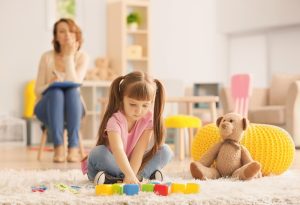
During Play Therapy, the counselor wants to give the child controlled freedom. The child is allowed to choose the toys in the room or games. The counselor does not look to push serious questions but instead observes and plays with the child. Usually sitting at eye level with the child, the counselor will ask the child about the toys or games the child likes and enjoys. Many times, the counselor will reflect and repeat what the child says and encourage the child to name the toys and express how the toys make them feel. To the foreign eye, it may seem as nothing is occurring but the counselor is attempting to not only gain trust, but is also engaging the child at symbolic and non-verbal way looking for cues of the child’s behavior. In other ways, the counselor is attempting to help the child better express verbally by granting the child freedom of labeling and naming toys. Some counselors may approach with a more directly with more interaction, while others may be less direct.
The room itself is a play room with numerous options for the child to choose from. This includes miniature figures, dolls, doll houses, stuffed animals, puppets, legos, building materials, and other sporting equipment. The toys are a doorway to the child’s symbolic mind and help facilitate healthy expression. Counselors may utilize other ways to express and open creative mindsets through songs and music, story telling or through uses of art, drawing, clay and painting. The key is to help the child tell his/her story, find healing, and discover other ways to find outlets and creative ways to express and rediscover oneself.
Some children who may be grieving, may use dolls or action figures as a way to reflect the life of family members around them. This symbolic expression correlates with their inability to express verbally but through play and expression instead. A child who may be experiencing grief over the loss of a family member, may play out death with a doll or action figure. In addition, certain toys or games or songs may trigger within the child physical symptoms of discomfort that the counselor may identify and notate. During certain activities, children may share information that otherwise would never emerge in an adult conversation.
Conclusion
All people grieve and children are no exception. When children are emotionally hurting, they sometimes do not act logically. To help children grieve and express emotion, counselors need to understand the language of the child. Due to brain development that is not as verbal in children, Child Grief Counselors need to understand the symptoms of emotional distress in children via Play Therapy. Play Therapy helps the child find safety and trust in expressing issues in the child’s own special way during play. Child Grief Counselors who specialize in Play Therapy can help children heal during play by allowing them to express in conducive and healthy ways.
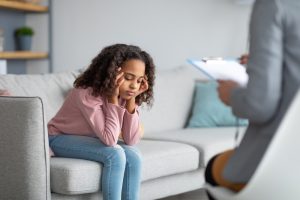
AIHCP offers a specialty certification in Child and Adolescent Grief Counseling for the American Academy of Grief Counseling’s certified Grief Counselors. This certification trains and educates Grief Counselors in the knowledge of grief in children. While pastoral and non licensed counselors can help individuals with grief, only licensed counselors with grief background, child psychology and training in Play Therapy are permitted to treat children suffering from emotional damage. Pastoral counselors trained in Grief Counseling and Child Grief Counseling, if not licensed, should refer children to clinical professionals with Play Therapy training.
AIHCP’s Child and Adolescent Grief Counseling Certification is online and independent study and open to qualified pastoral and clinical human service professionals, as well as those in the healthcare fields.
References and Additional Resources
Wolfelt, A. (2012). “Companioning the Grieving Child”. Companion Press
Good Therapy. “Play Therapy”. Access here
Melinda, S. et al. (2018). “Why Is Engaging a Child’s Brain and Body in Therapy Important?”. Good Therapy. Access here
Sutton, J. (2017). “Play Therapy: What Is It and How Does It Work?” Positive Psychology. Access here
Cohen, J. (2023). “How to Help Children Cope With Death and Grief”. Psychology Today. Access here
Parenting While Grieving
Parenting is not an easy vocation to start but when extra issues in life pile up, then parenting can become even more difficult. When stressors, losses, illness, or problems arise, parents still need to be able to fulfill their duties to their children. There are no days off when it comes to helping the kids with school, taking them places, cooking, caring and spending time with them but sometimes parents can feel the weight of life, especially during loss and grief. When grieving and mourning enter into a parent’s life, mother or father do not have the luxury to call off work, or not the children to school, or skip dinner or not wash clothes. Parents are called to march forward. This is critical but it can also be bad for grieving and mental health.
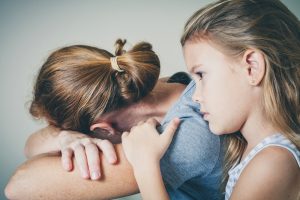
The mental health for a parent is extremely important. Like in an airplane, when the steward or stewardess explains that in an emergency, adults should place the oxygen mask on first before applying to a child, it is for a reason. If a parent falls, the child or children will also fall. So while duty is critical, it is also critical for parents to find the space and time needed to grieve or mourn. In this blog, we will look closer at the difficult times, when parents have to grieve and still perform at high levels for the welfare of their children.
Mental Health and Support
In times of loss, mental health care and support are so important. While to many of us, our parents appeared as super powered beings, the reality is they suffered the same emotions we suffer as adults. They had good and bad days. They did not always choose the right decision and had to learn the hard way and they also dealt with loss. As younger children, we may not have noticed this, or maybe even very rarely, but our childhood image of our parents is due to their excellent ability to care. Unfortunately, some individuals may have negative experiences with parents. Their parents may have fallen victim to drinking and abuse, or vanished when loss occurred. They may have spoken nothing of loss or pain and hid it to their own detriment.

Our experiences with our parents can easily shape our own when parenting-for good and bad. It is important when grieving to find a balance. It is OK to show vulnerability to a child but also to ensure that the child still feels secure. So when dealing with grief and loss, parents need to be able to balance their own feelings and the need to maintain the security and welfare of their children. This involves allowing oneself time to mourn. The grief needs to be processed and experienced. If the grief persists and intensifies, then one should seek help from a grief counselor, and if it becomes pathological, one should seek the aid of a licensed professional counselor,
Some parents have better support than others. Some have a spouse to help lean on, while others have a bigger family to share the grief. Some parents though may be single parents, or have little or no family support. They may be over worked and have a full schedule that prohibits time. These over bearing responsibilities may compound the grief. So while some may be able to find the help they need or take time off, others live in a colder reality. Whether blessed, supported or alone and over worked, one can still find basic help services and as well as find time. Time may need carved out of the day, but one needs to find the time to process the loss, mourn, and be able to express it outwardly. If one does not find time to re-generate, whether through a walk, meditation, spiritual journey, exercise, or a discussion with a good friend, then the grief will only become stronger and parental burnout may occur.
Sharing Emotion within the Family Unit
Families may tend to be overtly open with emotion or introvert in regards to expressing it. Grief myths that dictate time schedules, or expression of grief, or sharing grief with children, can only fracture the family unit more. Instead, express grief with a spouse, or the children. Communicate that daddy or mommy are very sad. Reassure to the children that this will not affect their security but share with them the reality that you are going through grief and loss. This is an excellent way for children to learn to express empathy. Children will hug and listen and in their own way express grief too. The grief may very well be affecting not just you but the children as well. Hence it is important to discuss the loss and include the children in discussion of the loss with real and concrete words about the nature of death. Let the children partake in rituals and ceremonies and allow them to comfort you.

For most parents, the loss in all probability is of a parent, or tragically a sibling. These types of losses are extremely painful and children will also experience a shared loss. While it may be your parent you lost, it still their grandparent. Hence, it is important to share grief with the child or children and both mutually heal from each other. This not only helps heal but it also passes on good mourning skills. Many children inherit bad mourning skills. They learn to hide emotion, or turn to improper coping methods to curb grief through imitation of mom or dad.
Families can also grow together closer through grief. While also expressing, they can also memorialize loss and remember together the person over time. In addition, they can build relationships that are stronger through this shared experience of loss. Parents can be good grieving examples to their children and children can be good and empathetic listeners when they are permitted into a circle. Excluding them can have negative effects on yourself but also their development.
The Loss of a Child
If a mother miscarries, or the couple lose a child already born, this has life long ramifications. It is in itself, its own blog, but this is when parents need to not only grieve for the loss but also help the child grieve the loss of his/her sibling. It is so important to involve the child in the rituals and to let the child speak verbally or through play. Monitoring the child and ensuring they are exhibiting no magical thinking is important. If the child has guilt for the death, then it needs dismissed. So while the parent grieves, the parent also is ensuring that the surviving child still heals properly from the loss. Again this is why it is so critical that the family grieves together and proper grieving styles are passed on to the next generation.
Conclusion
Parenting not easy but when grief and loss are thrown into the middle, it becomes far more difficult. Parents need to not only care for their own mental health but they also need to express loss and grief to their children to ensure security for the child but also an understanding of what grief is and how to share it and be empathetic.
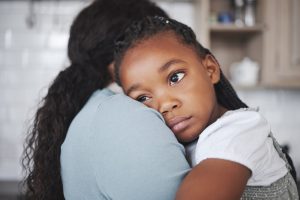
Please also review AIHCP’s Grief Counseling Certification, as well as its Child and Adolescent Grief Counseling Certification and see if the programs meet your academic and professional goals. The program is online and independent study and open to qualified professionals seeking a four year certification. The Child and Adolescent Grief Program is a specialty program that is only available for already those certified in Grief Counseling.
Additional Resources
“Can Parenting While Grieving Force You to Heal?”. Cytrynbaum, P. (2013). Psychology Today. Access here
“Parenting While Grieving”. Haley, E. (2015). Whats Your Grief. Access here
“Grieving While Parenting”. Eiseman, J. (2019). Mental Health Match. Access here
“Parenting while grieving”. Hetter, K. (2011). CNN. Access here
Child and Adolescent Grief
Children and their brains are developing things hence the processing of grief is a developing thing and is understood at differently at various stages. When loss occurs, one needs to understand the psychology of a child’s mind. What point of development will dictate the level of understanding of the loss. Hence in the field of child and adolescent grief, one can look at babies, toddlers, adolescents, and teenagers. Each group interprets loss differently. The idea of death also is different from age to age. Some children are not able to comprehend the permanence of death until older.
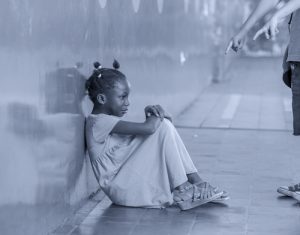
Many times, parents and adults due to a better lack of understanding of children and how they process grief make poor decisions when loss occurs. Adults and parents will sometimes hide death, or exhibit unhealthy grieving patterns themselves. These types of behaviors can be detrimental to the child’s development. Instead, one needs depending on the child’s age, to properly integrate the child to the experiences of loss and death.
The article, “Grief in Children: How to Help Kids Cope With Loss” by Michele Hirsch takes a closer look at the unique way children grieve. In the article, she points out the various emotions that can sometimes emerge in children. She explains the different ways grief manifests in children and how to pin point it. She also elaborates on how to help children grieve and discuss death at certain ages. Sometimes, children need to speak with someone who is specialized in adolescent and child grief. Overall, she states, children at younger ages have different views on death.
“When it comes to grief in younger children in response to a death, Linda Goldman, a licensed clinical professional counselor with a private grief therapy practice who teaches at Johns Hopkins University in Baltimore and has written many books about grief in children, explains: “It’s marked by causality, reversibility, and egocentricity.” Until about age 7, it is not uncommon for kids to think a death is their fault — and, that the person or pet might come back, she says.”
“Grief in Children: How to Help Kids Cope With Loss”. Michele Hirsch. December 2nd, 2022. Every Day Health
To review the entire article, please click here
Commentary
It is well established that the grieving process for children following a death is distinct from that of adults. This can be attributed to the many differences in cognitive and emotional development between the two age groups, which has an effect on how they respond to loss. Specifically, younger children may have difficulty understanding death as it is abstract, and thus may not feel a deep sense of sadness initially. Conversely, older children may resort to ways of coping such as denial or avoidance in their processing of the situation.

The phenomenon of young children and the reversibility of death is a complex concept which speaks to the complexities of human mortality. The notion suggests that due to the developmental immaturity of young children, they are unable to comprehend the finality and irreversibility of death, instead perceiving it as a temporary absence. This perception can lead to an inability to effectively process and cope with the loss in a mature manner, leading to psychological distress and maladaptive behavior.
Children can learn that death is permanent later as they develop but also through parental guidance. The first time a pet dies, or even a small fish, it is important to address it. Instead of protecting the child from loss and replacing the fish while the child sleeps, it is better to use the death as a lesson for future greater losses.
As children become older, the idea of death as a permanent reality is more concrete and established. It is even more so important to discuss death and loss during this period due to magical thinking. Many children may hold more accountability to the loss to themselves although not their fault. Words or thoughts of anger towards another before death can be held upon with great guilt and a false sense of causality. It is hence important for parents to discuss death and loss at this age.
From children to teens, children can act out in grief. Younger children can revert to bed wetting, teens can rebel, but it is important no matter the age, to stay in contact with one’s child during a loss or grieving period. It is important to understand their different emotional out bursts and emotional behaviors. The manner in which children respond to loss is a phenomenon that has garnered considerable attention from scholars in the field of psychology. Generally speaking, children tend to manifest varying degrees of distress when faced with the reality of loss, ranging from mild sadness to acute symptoms of depression. However, depending on the individual’s cognitive development and level of maturity, their reaction may also be characterized by more adaptive strategies such as seeking social support or distraction through play.
Pre adolescence may show numerous signs of regression or acting out. It is important to reassure younger children that everything is going to be fine and try to keep as close to a schedule as possible. In regards to older children, the idea of death is more permanent and it is more about stabilizing routine but also consoling, talking and discussing the loss. Adolescence is a period of heightened emotional development, which often involves an increased level of sensitivity to the concept of loss. This can be demonstrated through the emergence of various psychological and physical responses to the experience of grief, such as difficulty in concentration and sleep disruption. The adolescent may also experience feelings of helplessness, low self-esteem, depression and guilt, all of which could have significant implications for their social functioning. As the teenage years set in, new challenges can occur. Teenagers may act out, or engage in dangerous social activities. It is hence important for parents to be more active during these following months and not allow isolation to occur.
Conclusion
Due to past misconceptions about children and loss, there has been an attempt to protect children and shield them from death. Not permitting a child to attend a funeral, or displaying poor grieving habits to them can prove to be detrimental to development. Depending on their age and understanding of the concept of death, it is up to parents to help children know everything will be OK and that is not the child’s fault. In addition, it is important to help children understand the nature of death and to let them partake in death rituals to also express themselves. Parents should not be astonished to learn that children will also display grief differently, through play, or intermittent grieving, as well as older children displaying anger or outbursts. Depending on the child’s age will point to understanding and reaction. Parents can play a key role in helping their children learn better grieving habits and help them learn to experience the reality of death in the best healthy way possible.

Please also review AIHCP’s Child and Adolescent Grief Counseling Certification and see if it meets your academic and professional goals. The program is online and independent study and open to qualified professionals seeking a four year additional certification in Child and Adolescent Grief Counseling. The program, however, is only open to those who already have the basic Grief Counseling Certification.
Additional Resources
“How Children Process Grief and How to Help Them”. Nancy Lovering. February 21st, 2022. PsychCentral. Access here
“When Children Grieve” Edy Nathan. March 20th, 2019. Psychology Today. Access here
“Helping Kids Cope With Grief: 6+ Tips to Support Children”. Gabriella Lancia. May 17th, 2021. Positive Psychology. Access here
“15 grief activities for kids from elementary to teens”. Better Place Forests. July 22nd, 2022. Better Place Forests. Access here
Grief Counseling Training Program Video on Therapies for Children and Grief
There are numerous therapies to help children better communicate their grief. They can express through multiple outlets of creativity to help them express the grief and issues that haunt them. Counselors can help children through a variety of methods.
Please also review AIHCP’s Grief Counseling Training Program and see if it meets your academic and professional goals. The program is online and independent study and open to qualified professionals seeking a four year certification as a grief counselor. Please also review AIHCP’s Child and Adolescent Grief Counseling Training
Please review the video below
AIHCP’s Child and Adolescent Grief Counseling Program Video
Children react to loss differently than adults and even more so within their particular ages of development. It is important for Grief Counselors and other mental health professionals to have a thorough understanding of how children deal and cope with loss.
The American Academy of Grief’s Child and Adolescent Grief Counseling Program reviews the important elements of Child Grief Counseling. The program is online and independent study and open to qualified professionals seeking a four year certification in Child Grief Counseling. Please review the program and see if it meets your academic and professional goals
Child and Adolescent Grief Counseling Certification Article on Teen Depression
Teens go through a variety of changes. Physically, emotionally and socially, changes affect teens. It is of no surprise then, that many teens suffer from depression or anxiety due to the many stresses that fall upon them. Parents need to be alert and aware of their teen’s moods and problems. Good parenting demands inspection of one’s teen and to ask them questions about their day. When these things are neglected, issues such as anxiety or depression can emerge unchecked.

The article, “Teens, anxiety, and depression: How worried should parents be?” from Boston’s Children Hospital takes a closer look at how parents can notice depression or anxiety in their teen. The article states,
“Having a strong connection with an adult helps protect teens against anxiety and depression. This relationship could be with a parent, but it might not be. Depression and anxiety come with an enormous amount of shame and self-blame. Teens who feel this way may push their parents away. If so, parents can help their child cultivate a connection with a trusted adult, such as a coach, school counselor, or the parent of a friend.”
To read the entire article, please click here
Please also review AIHCP’s Child and Adolescent Grief Counseling Certification and see if it meets your academic and professional goals. The program is online and independent study and open to qualified professionals seeking a four year certification in Child Grief Counseling.
Child and Adolescent Grief Counseling Certification Article on Discussing Miscarriage
Miscarriages are sometimes a forgotten grief. Parents suffer greatly who lose a child due to miscarriage. It is unseen, and sometimes unknown, so the ability to find support can be difficult. Both husband and wife share in the pain but many times the born children are left in the dark regarding the lost. Children need to be explanations if a miscarriage occurs.

These explanations need to be age appropriate. They also need to ensure the child knows there is no blame for the loss but that sometimes these things can happen.
The article, “How To Talk To Kids About Miscarriage” by Jessica Zucker takes a closer look and on how to discuss the loss during miscarriage to children. She states,
“Much like conversations centering around divorce or a parent separation, it’s common for children to immediately blame themselves for a pregnancy or infant loss. This is primarily due to their cognitive development, which leave them centering themselves and/or only seeing things through their perspectives. So it’s vital that throughout the conversation, and perhaps even at the start, you remind your child that they are in no way responsible for any pregnancy outcome, especially one that ends in a loss. And, that it’s not the fault of the mom either.”
To read the entire article, please click here
Please also review The American Academy of Grief’s Grief Counseling Program as well as its Child and Adolescent Grief Counseling Certification and see if they meet your professional and academic needs. The programs are online and independent study and open to qualified professionals seeking a four year certification in Grief Counseling.
Child and Adolescent Grief Counseling Certification Article on Parent and Child Grieving
When a family loss strikes, parents and children grieve together, however, both grieve differently. Bad grieving habits can leave the children forgotten or left to wonder. It is critical to share positive grieving habits and also understand the needs of the child during the period of loss. Children grieve differently than adults so it is also critical to understand how children process loss. Parenting and grieving at the same time is one of the most difficult situations because the parent is trying to recover while help one’s child.

The article, “How to cope with grief when your kids are grieving, too” by Dr Ashwini Lal reviews how parents can grieve and help their children grieve. She states,
“Children, as they are going through the developmental process, will naturally have a different grief experience than adults. Depending on their age, children will need guidance with respect to the grieving process. Talking openly with them is a good way to model that it is okay to discuss grief and emotions. Their grief can be intermittent, meaning that you may notice they feel sad one moment and the next they are playing joyfully with their friends.”
To read the entire article, please click here
Please also review AIHCP’s Grief Counseling Program and also for those already certified in Grief Counseling, AIHCP’s Child and Adolescent Grief Counseling Certification. The program is designed for certified Grief Counselors and other qualified professionals.
